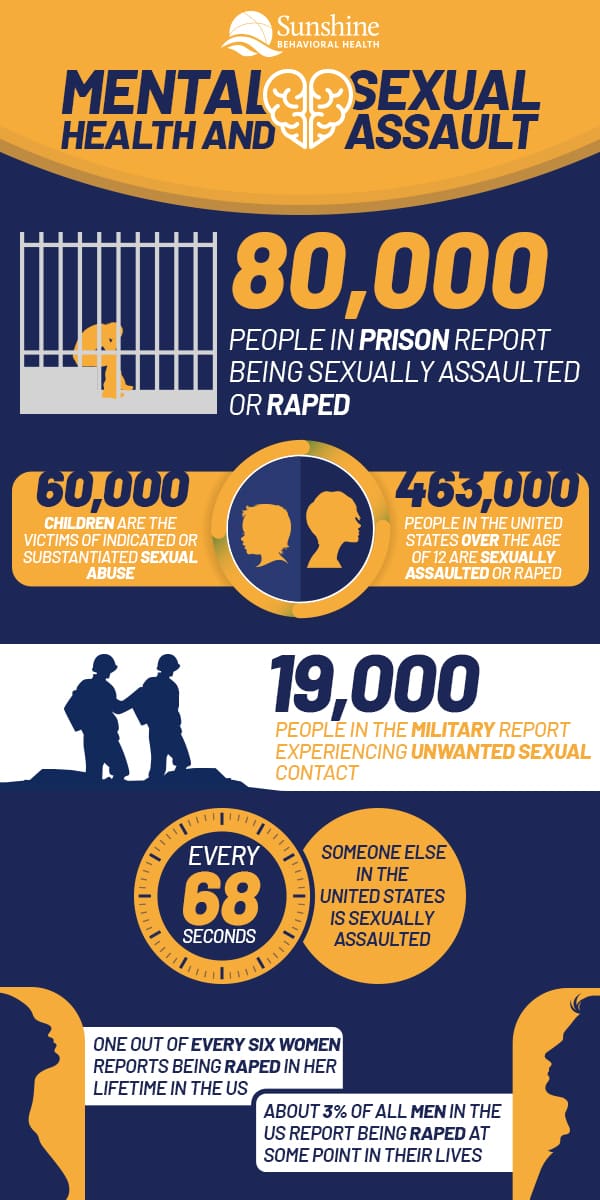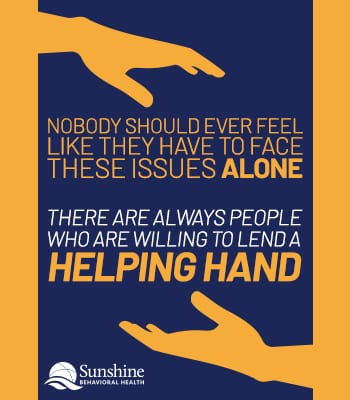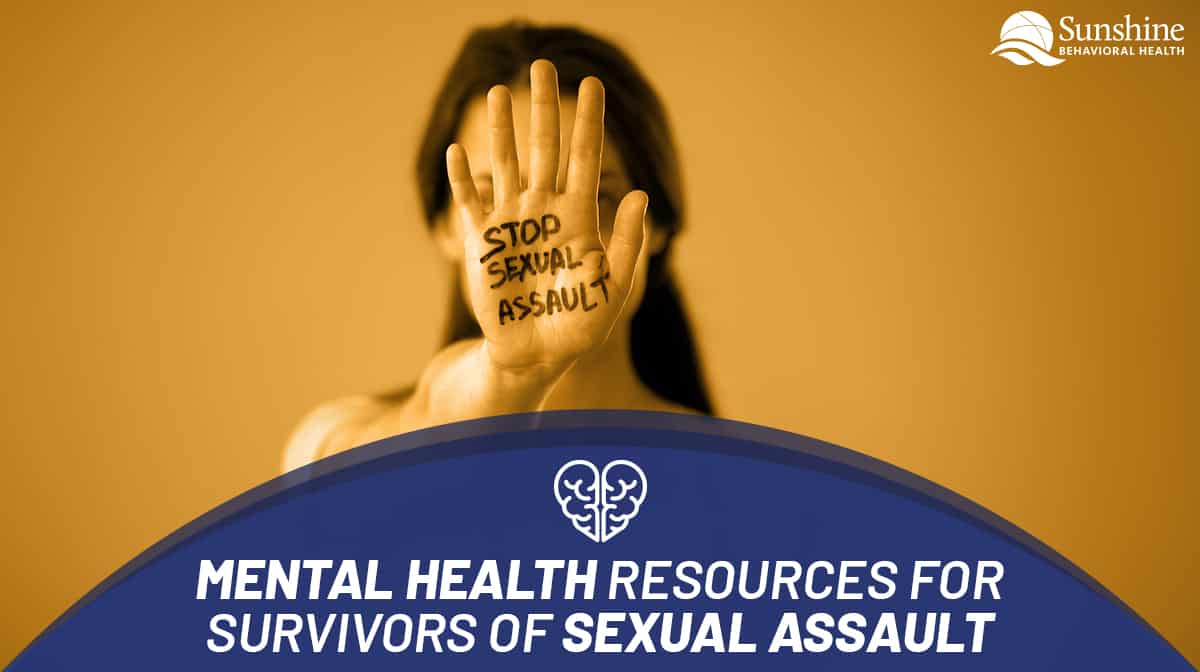Mental health is a significant and complex part of health care. As stigmas surrounding mental health have begun to fade, resources have emerged to address mental health conditions, including issues related to sexual assault.
More common than people realize, sexual assault can also lead to a variety of short-term and long-term issues, such as shock, shame, isolation, guilt, confusion, anxiety, and depression.
Examining the statistics related to sexual assault can help people understand its relationship to mental health issues. Such education can remind survivors and loved ones that they’re not alone and that they have resources available to assist them.
The Statistics Surrounding Sexual Assault: What Should People Know?
Sexual assault can impact anyone at any time:
- On an annual basis, more than 80,000 people in prison report being sexually assaulted or raped.
- Reports state that more than 60,000 children are the victims of indicated or substantiated sexual abuse.
- More than 463,000 people in the United States over the age of 12 are sexually assaulted or raped.
- Close to 19,000 people in the military report experiencing unwanted sexual contact.
- Every 68 seconds, someone else in the United States is sexually assaulted.
- In the United States, one out of every six women reports being raped in her lifetime.
- About three percent of all men in the United States report being raped at some point in their lives.
Statistics indicate that sexual assault affects people of all socioeconomic backgrounds, genders, and ages. It’s critical to understand the impact sexual assault can have on someone’s mental health.
By understanding the problems that might arise, it’s possible to get a better idea of what resources might be available to assist those in need. What are a few major examples of health problems that survivors of sexual assault might face?

Examples of Mental Health Problems Survivors of Sexual Assault May Face
There are several common problems that survivors of sexual assault may face. These different problems might manifest differently from person to person. A few examples of common mental health problems that survivors of sexual assault could face include:
Major Depressive Disorder
Depression is one of the most common mental health illnesses in the United States. When depressed, people feel sad, hopeless, and empty. The condition can be so serious enough that people consider or attempt suicide.
Survivors of sexual assault have a increased risk of developing depression because they might be experiencing shame, guilt, and other feelings after surviving the incidents.
A few common symptoms of depression include:
- Persistent feelings of emptiness
- Notable changes in sleep habits, such as sleeping too much or too little
- Significant changes in appetite, eating much more or less than usual
- Unintentional weight gain or weight loss
- Loss of pleasure in activities that formerly brought them joy
- Persistent feelings of restlessness and irritability
- Difficulty concentrating or remembering what happened
- Prolonged fatigue or energy loss
- Feelings of hopelessness or worthlessness
It is important for anyone who is experiencing these symptoms to seek assistance as quickly as possible to prevent suicide attempts. The earlier depression is detected, the sooner it can be treated.
When a survivor of sexual assault seeks treatment for depression, one of the first steps is to learn more about the circumstances that led to depression.
In many cases, therapy (such as cognitive-behavioral therapy, or CBT) can be combined with prescription medications that can help survivors of sexual assault effectively manage depression. Such approaches can lead to a significant improvement in their overall quality of life.
Post-Traumatic Stress Disorder (PTSD)
Another common mental health disorder that can develop in people who have survived sexual assault is post-traumatic stress disorder, also known as PTSD. Anyone who has been a victim or witness of a life-threatening situation, including sexual assault, can develop this disorder.
Examples of violent acts that could lead to PTSD include sexual abuse, rape, domestic violence, and molestation.
Spotting the symptoms of PTSD as quickly as possible can help people address them more effectively. A few common symptoms of PTSD include:
- Flashbacks or nightmares about the specific traumatic experience. People may have nightmares about memories, flashbacks to the event, and think about trauma constantly, which can cause distress and make it difficult to focus on anything else.
- Avoidance of anything that reminds them of the incident that caused the trauma. Survivors of sexual assault may not want to be around anyone who might remind them of that specific event, for example.
- Changes in thoughts and moods. Survivors might experience memory problems, place blame on themselves, and isolate themselves from their family members and friends.
- More extreme reactions. If people have survived attacks, they might be easily startled, could be constantly alert (a state of mind known as hypervigilance), and may be more irritable.
PTSD can present differently in different people. Seeking timely help from trained mental health professionals can help people manage the symptoms of the condition. Work with experienced professionals can help people manage the symptoms of PTSD, allowing survivors of sexual assault to lead a happier life.
Substance Use Disorders
Substance use disorders are also common among survivors of sexual assault. Because assaults often produce mental health issues, survivors of sexual assault may have a hard time coping.
Coping may become even harder if survivors are in such pain that they avoid people who are trying to help them. Instead, they might use less healthy mechanisms to deal with their pain. If the mechanisms include alcohol or drugs, it could lead to substance use disorders.
If they’re trying to figure out if they have a substance use problem, survivors of sexual assault could ask themselves a few questions:
- Do you notice that your personality is different when you drink or use drugs?
- Are you having a hard time facing social situations, which may cause you to use drugs or alcohol to help you?
- Do you miss important personal or professional obligations because of your drug use or drinking?
- Are you using drugs or alcohol to try to escape difficult problems that you should be facing?
- Did you use drugs or alcohol in the morning to help you wake up?
- Have your friends or family members expressed their concerns about your drug use or drinking?
Answering yes to any of these questions is a sign that a person may be suffering from a drug or alcohol problem.
When discussing sexual assault and substance use disorders, it’s important not to place blame. This discussion simply acknowledge that survivors of sexual assault are at higher risk of developing mental health conditions such as substance use disorders.
Pain from such conditions is real, but it shouldn’t be minimized or shamed. Instead, it should be treated.
Eating Disorders
As survivors of sexual assault cope with what occurred, they may also develop eating disorders. Eating disorders can present themselves in many shapes and forms. There are a few common examples of eating disorders, including:
Anorexia
Anorexia nervosa, commonly shortened to anorexia, is an eating disorder that is characterized by excessive weight loss and self-starvation. People with anorexia do not eat enough food, leading to significant weight loss.
An intense fear of weight gain and an obsession with size are common in people with anorexia. They may also engage in behaviors to prevent weight gain, including excessive exercise. People with anorexia might deny that they have an issue with their weight or eating.
Bulimia
Bulimia nervosa is another eating disorder. This condition is characterized by a cycle of binging and purging.
Typically, people with bulimia eat large amounts of food. They then feel a tremendous loss of self-control over their eating behaviors and use mechanisms such as diuretics, laxatives, or vomiting to purge the food and calories from their bodies. Like people with anorexia, they are also preoccupied with their body weight and shape.
Binge Eating Disorder
Binge eating disorder is similar to bulimia. Unlike bulimia, people with binge eating disorder do not purge after they consume their food.
They feel like they’re out of control as they eat tremendous quantities of food in a short amount of time. After they finish, they often feel tremendous distress, guilt, and shame.
Failure to address eating disorders quickly can lead to serious physical health concerns. Because survivors of sexual assault are prone to developing eating disorders, it is important to reach out to trained medical and mental health professionals for assistance.
Anxiety
Anxiety is common in everyone. In 2018, 6.68 percent of people in the United States experienced some type of anxiety.
The condition is also common among survivors of sexual assault. They may develop anxiety for several reasons, including:
- They are worried it might happen to them again.
- They are exposed to reminders of their trauma.
- They are worried that they will not be able to focus on their personal and professional obligations.
- They are concerned that people might judge them if they tell them what occurred.
Because survivors of sexual assault may develop anxiety, it is important to understand how it may appear. A few common symptoms of anxiety include:
- Feelings of restlessness or irritability
- Persistent feelings of fatigue
- Difficulties concentrating
- Constant muscle tightness or soreness
- Trouble falling asleep or staying asleep
Since there are different types of anxiety disorders, there are also different treatments. Multiple types of therapy that can be helpful to treat anxiety. They are also prescription medications that can help people control low levels of background anxiety as well as acute panic attacks.
Survivors of sexual assault could also work with trained mental health professionals to manage symptoms of anxiety.
What Mental Health Resources Are Available for Survivors of Sexual Assault?
 Many resources can help survivors of sexual assault. Survivors of sexual assault should consider reporting the incidients to law enforcement authorities.
Many resources can help survivors of sexual assault. Survivors of sexual assault should consider reporting the incidients to law enforcement authorities.
They might also find it helpful to speak with supportive family members and friends to discuss what happened. They can also speak with trained mental health professionals who can help them develop a comprehensive treatment plan and tools for managing their lives.
Helpful resources available for survivors of sexual assault include:
- The Rape, Abuse & Incest National Network (RAINN). RAINN works with organizations throughout the United States to address sexual assault. It operates a National Sexual Assault Hotline – 800a656aHOPE (800a656a4673) – and provides other resources and information.
- The Centers for Disease Control and Prevention (CDC): The CDC’s Division of Violence includes resources that can help individuals who have suffered sexual violence. The resources can help people learn more about sexual violence, the symptoms of mental health disorders, and additional resources that are available.
- Child Welfare Practices for Cases with Child Sexual Abuse. Developed by the Oregon Department of Human Services, this resource was developed to assist children and promote children’s safety in the home. It also helps children and families who are victims of sexual violence.
- The National Center on Domestic Violence, Trauma, and Mental Health. This resource develops and promotes culturally relevant, accessible, and trauma-informed responses to a wide variety of sex abuse situations. This resource can help people who are interested in learning more about mental health and sexual assault.
Nobody should ever feel like they have to face these issues alone. There are always people who are willing to lend a helping hand. From family members to friends, medical professionals, mental health professionals, and nonprofit organizations, survivors of sexual assault have resources available to them.
Helpful Links
Sources
Medical disclaimer:
Sunshine Behavioral Health strives to help people who are facing substance abuse, addiction, mental health disorders, or a combination of these conditions. It does this by providing compassionate care and evidence-based content that addresses health, treatment, and recovery.
Licensed medical professionals review material we publish on our site. The material is not a substitute for qualified medical diagnoses, treatment, or advice. It should not be used to replace the suggestions of your personal physician or other health care professionals.







